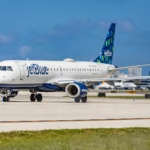Nigeria Air, which is due to begin operations next year, has gained the interest of Emirates and Qatar Airlines.
Emirates offers support
Emirates and Qatar Airlines have both come out in support of Nigeria’s new flag carrier, Nigeria Air, which is due to start flying next year. The much anticipated national airline is being set up by Nigeria’s government but will be a private venture, with the government holding no more than a 5% share. They are looking for international partner airlines to hold 49% equity in the new company.
Qatar Airways are one of the legacy carriers looking for a technical partnership, as they already have flights in and out of the West African nation. Emirates has said they will support Nigeria Air, but only if invited to by the federal government. At the World Government Summit 2022 in Dubai last month, Emirates CEO Tim Clark said:
“Is there a Business Case for the carrier? Of course, there is. There is an enormous Business Case to it. Nigerians are seeking to travel all over the world. Nigeria is the powerhouse of Africa. We are over interested in flying there because it is a rich nation in terms of demand for services.
“If the minister needs some assistance on how to go about practising a blueprint, we will be very happy to help. They understand what they are doing and they are doing it. Probably next year, they will have a very good carrier flying; and please come to Dubai because there is so much demand,”
The creation of a new national airline
Nigeria Air has been a long time coming. The airline was a campaign pledge for President Muhammadu Buhari in 2015 and was officially announced at the Farnborough Air Show in 2018. Minister of Aviation Hadi Sirika said in November 2021 that the airline would begin operations in April 2022, but that deadline has since been pushed back to 2023. the new start date would mark two decades since the dissolution of Nigeria’s old national carrier, Nigeria Airways, which ceased its operations in 2003.
Unlike the old project, the government will not own a majority stake in the new venture. The plan is for it to be a Public-Private Partnership project, with the government holding only five per cent. Nigerian investors will be given a 46% stake so that the airline is majority Nigerian owned, in compliance with Nigerian law. The remaining 49% will be sold to international partner airlines.

There has been opposition to the Airline receiving support from airlines already competing with Nigeria Air on its Bilateral Air Service Agreement (BASA) routes. Secretary-General of the Aviation Safety Round Table Initiative (ARSTI) Group Cpt. John Ojikutu commented:
“Using Qatar, Turkish or any Middle East country, EU, and U.S. Airlines that are on our BASA routes, in any partnership, cannot profit the airline. Get technical partners from Australia, New Zealand, Canada, and so on,”
Ojikutu believes that the government should take a 10% share, with only 40% going to foreign investors and technical partners.









